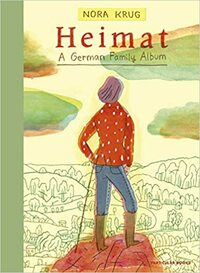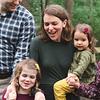Take a photo of a barcode or cover
Krug's art design for the book is beautiful, however I personally found the narrative lacking. Throughout the novel, she is obsessively searching for empathy and connection to her past family members on an individual level that I believe can overshadow the larger, more diverse history at hand.
I understand that this is her memoir about the personal story of her German, non-Jewish family. However, while reading, I couldn't help but think that her entire journey would be almost impossible for any Jewish ancestor from the similar region to do. Krug is able to travel to her still intact ancestral towns/communities and speak with those who remember her family and the history of the town. She can visit her father's childhood bedroom that still has the same wallpaper and the farmland he still owns that he plans to pass down to her.
I was waiting for an exploration of this difference of experience between gentile and Jewish Germans who try to explore their ancestry, but there was none.
Krug writes about the antisemitism she witnesses in a more open-ended, "artistic license" way that leaves it up to the reader's interpretation, which was strange to experience when contrasted to the very explicit emotional journey every step of the way to figuring out if her family really was involved in the Nazi Party and, if so, were they actually one of the "good ones". I was not satisfied with this decision.
I found the portrayal of her interactions with Jews ridiculous. There is no such thing as Jewish anger or hurt, every single Jew is there to tell her that she has no reason to feel guilty and that Germany has paid enough for its sins. The Jews in this story have one of two roles: to either absolve her or be dead and invisible. In her research, she's keeping an almost literally tally of all the Jews her family was nice to. While it may be honest to her personal experience managing ancestral guilt, it is uncomfortable to read as a Jewish person and too over the top.
It is difficult to write this review because I respect the author for speaking from a vulnerable place on a sensitive topic. I also am not here to judge Krug as a person, rather am speaking about this specific book that she put out.
I understand that this is her memoir about the personal story of her German, non-Jewish family. However, while reading, I couldn't help but think that her entire journey would be almost impossible for any Jewish ancestor from the similar region to do. Krug is able to travel to her still intact ancestral towns/communities and speak with those who remember her family and the history of the town. She can visit her father's childhood bedroom that still has the same wallpaper and the farmland he still owns that he plans to pass down to her.
I was waiting for an exploration of this difference of experience between gentile and Jewish Germans who try to explore their ancestry, but there was none.
Krug writes about the antisemitism she witnesses in a more open-ended, "artistic license" way that leaves it up to the reader's interpretation, which was strange to experience when contrasted to the very explicit emotional journey every step of the way to figuring out if her family really was involved in the Nazi Party and, if so, were they actually one of the "good ones". I was not satisfied with this decision.
I found the portrayal of her interactions with Jews ridiculous. There is no such thing as Jewish anger or hurt, every single Jew is there to tell her that she has no reason to feel guilty and that Germany has paid enough for its sins. The Jews in this story have one of two roles: to either absolve her or be dead and invisible. In her research, she's keeping an almost literally tally of all the Jews her family was nice to. While it may be honest to her personal experience managing ancestral guilt, it is uncomfortable to read as a Jewish person and too over the top.
It is difficult to write this review because I respect the author for speaking from a vulnerable place on a sensitive topic. I also am not here to judge Krug as a person, rather am speaking about this specific book that she put out.
Moving and fascinatingly built. A scrapbook, a family history and a memoir all in one.
dark
emotional
reflective
fast-paced
Very interesting graphical novel that focuses on a German-American diving into her family's past to discover her history. The one thing that somewhat drove me crazy was there were multiple times where she made you read left to right with an image in the middle. It made it sometimes hard to comprehend. Overall a good read.
I have mixed feelings about this book. I think formally the blending of family records, momentos and found documents often worked really well. It created an atmosphere and worked better than say just having lots of pictures thrown in.
On the other hand I found that neither the story, nor the writing, nor for that matter the illustrations really compelling enough to stretch out for the whole book. I did find it fascinating in places and I as glad I read it but the formal experimentation and effectiveness of blending photos, found artifacts etc. with a graphical novel is more what I will remember.
Some of that though did feel gimmiky and there were times when pages were needlessly hard to read due to either reading psydo hand writing, writing on dark /cluttered backgrounds, or weird wrapping of words around pictures.
In terms of exploring Germans coming to terms with their past I have read better books but this was still a good and interesting one.
On the other hand I found that neither the story, nor the writing, nor for that matter the illustrations really compelling enough to stretch out for the whole book. I did find it fascinating in places and I as glad I read it but the formal experimentation and effectiveness of blending photos, found artifacts etc. with a graphical novel is more what I will remember.
Some of that though did feel gimmiky and there were times when pages were needlessly hard to read due to either reading psydo hand writing, writing on dark /cluttered backgrounds, or weird wrapping of words around pictures.
In terms of exploring Germans coming to terms with their past I have read better books but this was still a good and interesting one.
Emotional and informative. A creative journey that I will take again and again.
Told in part field journal, part graphic novel, part scrapbook; Nora chronicles her journey uncovering her family's involvement in the Nazi regime and war.
Told in part field journal, part graphic novel, part scrapbook; Nora chronicles her journey uncovering her family's involvement in the Nazi regime and war.
dark
emotional
informative
inspiring
mysterious
reflective
sad
slow-paced
Bukunya so good so cool 🤩🤩🤩
Dengan format seperti catatan harian, penulis mengajak kita untuk menelusuri rekam sejarah keluarga dan kota asal kedua orangtuanya saat Perang Dunia II.
Aku terkagum2 lho, sedemikian apik pengarsipan yg dilakukan oleh pemerintah kota di Jerman sehingga penulis bisa menelusuri surat menyurat yg dilakukan orang2 pada masa lalu dan membayangkan kemungkinan yg terjadi.
Meskipun bentuknya adalah grafik novel, bagiku ini bukan buku yang mudah untuk dibaca baik secara konten maupun emosi. Dan bagiku, penulis keren banget dalam menggambarkan suasana dengan kata-kata dan ilustrasinya.
Dengan format seperti catatan harian, penulis mengajak kita untuk menelusuri rekam sejarah keluarga dan kota asal kedua orangtuanya saat Perang Dunia II.
Aku terkagum2 lho, sedemikian apik pengarsipan yg dilakukan oleh pemerintah kota di Jerman sehingga penulis bisa menelusuri surat menyurat yg dilakukan orang2 pada masa lalu dan membayangkan kemungkinan yg terjadi.
Meskipun bentuknya adalah grafik novel, bagiku ini bukan buku yang mudah untuk dibaca baik secara konten maupun emosi. Dan bagiku, penulis keren banget dalam menggambarkan suasana dengan kata-kata dan ilustrasinya.
emotional
reflective
sad
slow-paced
"Belonging: A German Reckons with History and Home" is a thought-provoking scrapbook-style graphic memoir in which German immigrant Nora Krug wrestles with her family history and tries to unravel her grandparents' connections to the attrocities that happened in Nazi Germany. Pictures, letters and documents, illustrations, and text are presented in a unique and immersive mix.
I really knew almost nothing about what life was like in a post-WWII, post-Hitler Germany. (I was fascinated by the different categories that were assigned to Germans as part of the de-Nazification process: Major Offenders, Offenders, Lesser Offenders, Followers, and Exonerated Persons.) And I had not given much thought to what the generations of Germans who were born after WWII felt about the dark weight of the Nazi legacy.
Krug, at least, is burdened with shame and angst. She touches briefly on her childhood in Karlsruhe, Germany, but the majority of the book follows her investigations as an adult to learn more about what her maternal and paternal grandparents and paternal uncle, who died in the war while serving in the SS, really believed or did while the Nazis were in power. She seeks hopefully for evidence that they were not guilty of the worst crimes and clings to shreds of stories that showed them in the best light (hiding a former Jewish employer in a shed, for example). But ultimately, she has to accept how little she can possibly know and that even if they were merely "Followers," that there was still complicity, willful blindness, and self-preservation over action. This is a heavy book. It is a meditation on cultural shame.
But please be aware that this is not a Holocaust book. The Jewish experience is not looked at closely, though it is the foundation of Krug's quest.
I really knew almost nothing about what life was like in a post-WWII, post-Hitler Germany. (I was fascinated by the different categories that were assigned to Germans as part of the de-Nazification process: Major Offenders, Offenders, Lesser Offenders, Followers, and Exonerated Persons.) And I had not given much thought to what the generations of Germans who were born after WWII felt about the dark weight of the Nazi legacy.
Krug, at least, is burdened with shame and angst. She touches briefly on her childhood in Karlsruhe, Germany, but the majority of the book follows her investigations as an adult to learn more about what her maternal and paternal grandparents and paternal uncle, who died in the war while serving in the SS, really believed or did while the Nazis were in power. She seeks hopefully for evidence that they were not guilty of the worst crimes and clings to shreds of stories that showed them in the best light (hiding a former Jewish employer in a shed, for example). But ultimately, she has to accept how little she can possibly know and that even if they were merely "Followers," that there was still complicity, willful blindness, and self-preservation over action. This is a heavy book. It is a meditation on cultural shame.
But please be aware that this is not a Holocaust book. The Jewish experience is not looked at closely, though it is the foundation of Krug's quest.
Dark. Almost oppressive. A woman searches her family's history to understand what they did or did not do in Nazi Germany. Readable but for the subject matter which made it pretty hard to read. For added resonance, an important chunk of the book takes place in Karlsruhe - the only part of Germany I've been to. Certainly shows the quite varied way graphic novels can be used to tell a story. Another book I wouldn't have found without the Lynd Ward Graphic Novel Prize.




